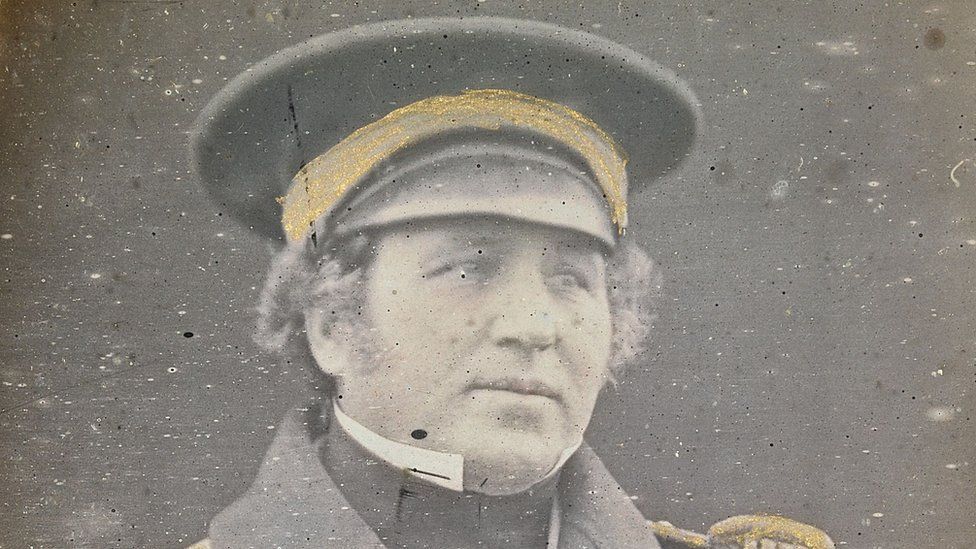An original portrait photograph of a famous Arctic explorer, taken shortly before the doomed Franklin expedition, will be auctioned in London next month.
Capt Francis Crozier and 13 other senior officers were photographed in May of 1845.
The complete set of 14 portraits will be auctioned by Sotheby’s.
Two images in the set, including Capt Crozier’s, are missing from the only other original collection of these portraits known to exist.
Sir John Franklin’s expedition to find a Northwest Passage through the Canadian Arctic became one of the best-known maritime mysteries of all time after the ships HMS Erebus and HMS Terror disappeared without a trace in the summer of 1845.
At the request of Sir John’s wife Lady Jane Franklin at least two sets of 14 daguerreotypes, or early photographs, were taken on board HMS Erebus in the days before the ships’ departure. The portraits were made by the Beard Studio, founded by pioneering photographer Richard Beard.
One of the sets is currently held by the Scott Polar Research Institute (SPRI) in Cambridge, but it lacks images of Capt Crozier, commander of HMS Terror, and Robert Sargent, a mate on HMS Erebus. To date, historians have only had access to copies of these two men’s daguerreotypes.
Franklin researchers had long speculated as to whether the second, complete, set of original daguerreotypes survived.
The 14 portraits that have now emerged for auction were owned by Franklin’s descendants.
The sale is estimated to fetch between £150,000 and £200,000.
All of the daguerreotypes will be exhibited in public together, for the first time ever, at Sotheby’s this September.

“These images are absolutely astonishing, the clarity is wonderful,” says Michael Smith, biographer of Capt Crozier. He notes that Capt Crozier was the only crew member from HMS Terror to be photographed and that this daguerreotype is the only known original photograph of him in existence.
Neil Arnold, director of the SPRI, says some of the daguerreotypes in the Sotheby’s set show “substantial” differences to those in SPRI’s collection – such as the portrait of Charles des Voex, who is wearing different clothes and striking a slightly different pose.
Although known to the Franklin family, the set of daguerreotypes was, for all intents and purposes, “lost” to the wider world until now, says Emily Bierman, global head of photographs at Sotheby’s: “Certainly, the hope was that they would be uncovered or come to light one day.”
HMS Erebus and HMS Terror became trapped in ice floes in September 1846 and were deserted the following April.
A note left by members of the expedition on King William Island, and found by explorers in 1859, revealed that Sir John Franklin died on 11 June 1847. After this date, Capt Crozier was in charge of the 105 then surviving members of the mission – all of whom are ultimately thought to have perished.
HMS Terror, originally a Royal Navy warship, was built in 1813. Coincidentally, the wreck of the vessel was discovered in Terror Bay in 2016. The wreck of HMS Erebus was located in 2014.
The Franklin explorers brought their daguerreotype camera with them. Mr Smith says that marine archaeologists are hopeful that images taken during the expedition could be recovered from the device, if it were ever found.
That would be “an amazing historical development”, he says.
This video can not be played
To play this video you need to enable JavaScript in your browser.
Related Topics
- Arctic
- Photography
